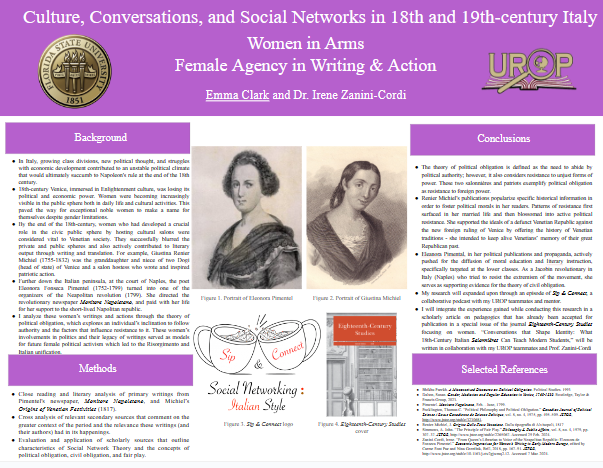Research Symposium
24th annual Undergraduate Research Symposium, April 3, 2024
Emma Clark Poster Session 1: 9:30 am - 10:30 am /139

BIO
Emma is a freshman from St. Louis, Missouri, who is currently double majoring in Political Science & Philosophy. After completing UROP, Emma will continue working with Dr. Zanini-Cordi and the "Culture, Conversations, and Social Networks in 18th and 19th-century Italy" team to complete a pedagogical essay that has been accepted for publication in a special issue of Eighteenth-Century Studies. The team has also received an IDEA Grant to continue their investigation into various topics related to Social Network Theory, 18th century Enlightenment culture, and the lives and writings of various salonnieres. Their findings will culminate in the production of 16 additional episodes of Sip & Connect and a final presentation at the President's Showcase of Undergraduate Research Excellence in the fall.
Culture, Conversations, and Social Networks in 18th and 19th-century Italy: Women in Arms
Authors: Emma Clark, Irene Zanini-CordiStudent Major: Political Science/Philosophy
Mentor: Irene Zanini-Cordi
Mentor's Department: Modern Languages & Linguistics Mentor's College: College of Arts & Sciences Co-Presenters:
Abstract
The connotations of an 18th-century woman stand to be redefined by those women who worked with the system that inherently opposed them. 18th-century Italy brought about a plethora of women who chose to define new standards for female behavior and civility in using their own intellect to attempt to resurrect a dying republic. Two such women were Eleanora Fonseca Pimental and Giustina Renier Michiel. This research seeks to provide insight into the ways in which these women redefined freedom, justice, and equality for both Italian women and the Italian Republic in wake of unification while analyzing the role that philosophy of political obligation played in their resistance. Key sources include Pimental's newspaper, Monitore Napoletano, Michiel’s Origins of Venetian festivities, and several close secondary sources that build a picture of the political, economic, literary, and social advancements these women made. My research consists of cross analysis of these writings to identify how political theory can be used to describe their accomplishments. In order to understand the nature of the changing definition of a woman in 18th-century Europe, it is important to study the women who made themselves prevalent in mainstream and sophisticated society, as they set the standard for female behavior and the relationship between a woman and the society she lives in. This research pays homage to two such women.
Keywords: History, Italy, women

